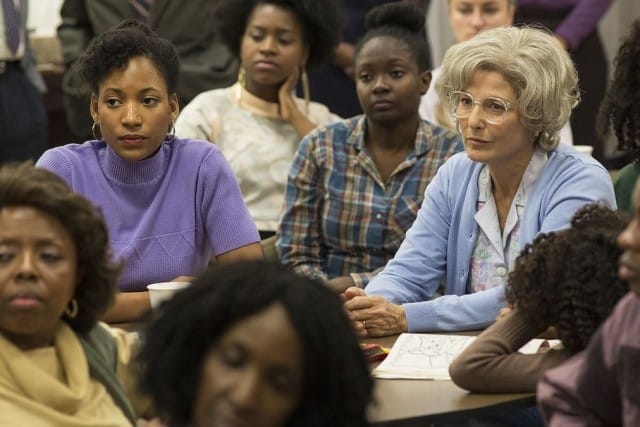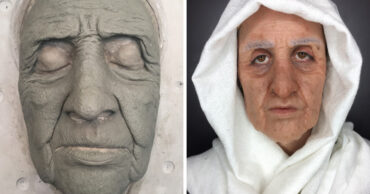
David Simon’s television, while very much a catalog of big ideas and important examinations, is defined by its smallest moments: a sister opening up a door at the top of the stairs, a trombonist having his instrument returned to him, a son fixing a home his father was never able to finish. For all the (deserved) acclaim for what Homicide, The Corner, The Wire, Generation Kill, and Treme had to say about the world, its defining moments are really those intimately spent with the people in it: a group of corner boys hanging out talking about chess, or a group of people hanging out in a bar after a funeral. David Simon makes shows about politics and society, yes – but he also makes shows about life, and community, and the eternal hope we have as humanity to save us from ourselves.
Show Me A Hero‘s final two chapters are a testament to David Simon and William Zorzi’s writing: “Part Five” and “Part Six” are the epitome of Greek tragedy, embedding the irony of one man’s political downfall, just as the program he sacrificed his career arc for changed the lives of hundreds of people. While Nick Wasicsko spends much of “Part Five” trying to fight his way into a new Democratic administration in Yonkers that wants to write him off, the other characters of Hero are experiencing the very thing he was fighting for: Norma, Billie, and Doreen all get spots in the new townhouses, offering them the very opportunity at new life that politicians so often spout off at the mouth about providing, but never follow up on.
Of course, that isn’t a fix-all solution: the deep racial tensions of Yonkers remains, and the various municipal hoops residents have to jump through end up getting Billie evicted, when her boyfriend murders a woman during a robbery and mentions that he’s staying at her townhouse. There must be balance in the universe, after all: while Carmen sits on the sidelines hoping she’ll get her name off the wait list one day, Norma and many of the new residents begin to regret their decision to move, feeling less safe in the quiet suburbs than the day in the noisy project areas, the former army barracks that devolved into un-maintainable housing as the world moved from World War II to the first Iraq War. “Part Six” in particular explores the dichotomy of the experience in the new townhouses: where “Part Five” is content to revel in the progress made by actually getting them built, “Part Six” is a stark reminder that politics hardly ever does any good – and when it does, it still takes the community of people living outside the strange, twisted world of powerful popularity contests to actually keep civilization together and moving forward (even when they do, it’s a struggle: the housing developments remained in the courts in various forms until 2007, when the case was finally settled). Doreen might not be able to get anyone to come to her neighborhood party, but by the end, even Poodle Lady is beginning to warm up to the people who “invaded” her home town: even as the political systems of the world try to hold us back, the natural, slow evolution of the world never stops, and Show Me A Hero concludes by reminding us of that important point.
With all that hope and prosperity, however, comes the downfall of Nick Wasicsko: by the end of episode six, he’s become so desperate to be relevant in politics again that he runs against his best friend for decades, severing his friendship with Vinni (who herself gets dirty towards the end, making a vague allusion to a fake affair to Nay on election day) and making it much easier to put himself on the chopping block for Zeleski, who Wasicsko quickly made enemies with when he felt the new mayor didn’t appreciate the blood-red carpet Wasiscko sold his soul to lay out for him. Consolidated power, a longer term, a successful housing bill coming to fruition: while Zeleski’s political career would only run for that one four-year term, the many nails it put into the coffin of Wasiscko’s own career is powerful, more than enough to counter the cautiously positive vibes the new members of said housing development were experiencing.
Wasiscko’s downfall is as hard to watch as Poodle Lady’s conversation with Doreen’s son is heartwarming: politics is a BS, zero sum game, a machine that only knows how to be operated by few, and one that seemingly runs on the souls of the people its supposedly governing and protecting. Politics is something that burns us more often than it helps us, an increasingly obfuscated process of legislation and management that is ever-shifting, and never actually working in the interest of its own people: as Wasicsko notes, you can run on any platform, but none of that matters when it comes time to ‘govern’, a game played outside of the public realm, where power is determined not by votes, but by a combination of charisma, collaboration, and manipulation: it’s not a game many can play, but it is one as addicting as gambling or a nasty drug habit.
Nick Wasicsko was addicted to politics: “Part Six” makes that quite clear, with him throwing his wife’s career to the wind, along with his own political future. He was addicted to the attention he got: more so, he was addicted to the love, never able to draw the line between votes and emotions, and how fundamentally different the two are. Politics, after all, is not life, and no matter how many elections Nick won, it would never be “alright” (my favorite NW catchphrase) as long as that old man in the janitor suit wouldn’t embrace and love him. Like most literature about a male tragic figure, Show Me A Hero is ultimately about misguided hubris borne from a man’s desperation to be loved by his father: Nick might have been smiling the day he was elected mayor, but his frequent visits to the cemetery prove that he was eternally locked in a losing battle, against a dead man who could never give Nick the love he wanted, or needed.
Watching Nick beg his wife not to go back to work is when the dread really sets in: no matter how many hopeful images we get of Mary and Doreen having coffee on the porch, Nick’s growing anxiety and depression in the final two episodes is the haunting image Show Me A Hero leaves us with: is this the true cost of politics, of “getting things done”? Nick’s political career was defined by supporting a judge’s order that he voted to not comply with: a measure that has had immeasurable impact on the public housing systems (and construction of such) around America, and changed the lives of hundreds of people, along with pushing a generation of people into a new, more progressive social age. Progress in America, thanks to bureaucracy, is an uphill battle to deep sacrifice, a land that built itself on compromise, and continues to operate on the decisions of those who manipulate those compromises into their favor.
Often, those sacrifices are never even felt: and it leaves Nick feeling trapped and alone in a world that can’t give him break – a mentality captured beautifully when Paul Haggis’ camera frames Nick between the bars of the railing at the top of the stairs. In the end, politics (save for the very few, and very, very powerful) is an empty game, a machine that never stops spinning or moving forward: once someone has been discarded from that machine, it’s up to them to find a direction. Nick Wasicsko, driven by disappointing his dead father and realizing he didn’t really believe in anything at all anymore (something Vinni points out to him when she finds out he’s opposing her in the election), never found one – and takes his own life as the series closes, the ultimate dark irony of the push and pull of life (perhaps the most ironic fact pulled from real life is how Nick was buried on Election Day in 1994, the first time in 8 years his name appeared nowhere on the ballot).
The victories and defeats of Show Me A Hero are perfectly Simon-esque, bringing a series about a thirty-year old public housing debate to the most poignant, affecting close one could possibly imagine, and tying it very neatly into the discussions we’re still having about race and politics in this country today. It’s both a human tragedy, and a story of society’s slow, but very measurable progress: the balance between the two elements is striking, but interwoven with each other beautifully, connections that come to life in the close-knit stories of these final two parts, drawing together the more fragmented early hours in evocative, powerful ways. And most of all, it’s a powerful story about a man who wasn’t as courageous or inspirational as he thought, a man who affected real social change, and was effectively buried by both the suits and the public for it. It’s an ugly world we live in, after all, but the only way we’re going to make it through is together, and Show Me A Hero never forgets the good, the bad, and the ugly of that important, integral fact of our existence.
[Photo via HBO]
 Follow Us
Follow Us



